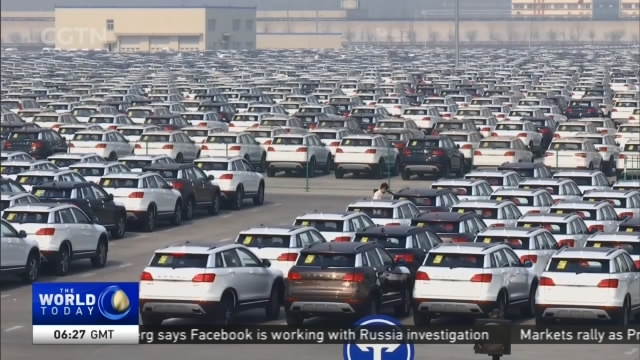
14:41, 11-Apr-2018
The Gas-Free Future: China's electric vehicle becomes more market-driven

The future of transportation is said to be without the humming of petrol engines. But how far away is China from a gas-free future? Yang Chengxi takes a look at how China's new energy vehicle market has evolved to be more market-driven, and how its battery makers are becoming the leaders in the industry.
One of the clear trends in the global auto sector these days is that governments are determined to promote electric cars. That's easily seen in the fact that eight European countries already intend to bar sales of gas-fueled car by as soon as 2025.
YANG CHENGXI SHANGHAI "Top Chinese auto sector officials say that they are creating a timetable for also doing the same here. The future in China seems to be just around the corner from where the exhaust pipes are a thing of the past."
Seven hundred and seventy-seven thousand new energy cars were sold in China in 2017. That accounted for more than half of all global sales. China remains one of the fastest-growing markets for EVs.
GORDON GAO PROJECT MANAGER OF AUTO PRODUCT PRACTICE, J.D.POWER "From the intender study we show that 29 percent of consumers said they may consider the plug-in HEVs in their future purchases and 16 percent of consumers said they may consider all electric vehicles in their next purchase."
However, those upcoming purchases may be motivated more by economics than by environmental concerns. Numerous analysts believe that China's enthusiasm for electric cars is linked to generous government policies that have subsidized domestic EV automakers since 2013.
GORDON GAO PROJECT MANAGER OF AUTO PRODUCT PRACTICE, J.D.POWER "60 percent of the EV models sold in China last year are the compact mini segment with a price range between 50 thousand to 60 thousand."
China is moving to make its EV sector more market driven and that's giving foreign automakers a chance to catch up. BMW launched its sixth new energy car, the 5 series plug-in hybrid, in March. BMW aims to move deeper into the domestic-dominated sector by pricing its newest model about 200 thousand yuan cheaper than its previous version.
SEAN GREEN SENIOR VP OF SALES & MARKETING, BMW BRILLIANCE "As a premium provider, it gives us an opportunity to move away from sort of the lower entry cars and move into premium cars. Of course, this is good for us as a premium brand."
The major manufacturers will be required to include electric cars as at least 10 percent of their total production after 2018. Many have already adjusted their investment and production plans. The biggest hurdle remains developing long-lasting car batteries and some Chinese companies are working on that. Ningde-based CATL is now the world's biggest battery maker. The 7-year-old company in Fujian Province is the major supplier for most domestic and global brands including Mercedes and BMW.
SEAN GREEN SENIOR VP OF SALES & MARKETING, BMW BRILLIANCE "So we work extremely closely in partnership and this is an important strategic relationship that we keep close to the battery supplier. Because this is the most critical supply chain for any NEV of course."
CATL's net profit hit 4 billion yuan last year and the battery maker is preparing an IPO in China. The company's meteoric rise is a testament to China's role in the global electric vehicle revolution. The EV dynamic in China is rapidly shifting and all of the players in the sector are super-charged to drive ahead. YCX CGTN SH.

SITEMAP
Copyright © 2018 CGTN. Beijing ICP prepared NO.16065310-3
Copyright © 2018 CGTN. Beijing ICP prepared NO.16065310-3